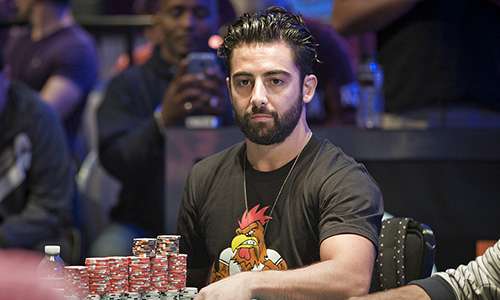Aaron Massey, Brian Hastings Call Out Dwyte Pilgrim over Alleged Bad Debt
There’s no doubt that playing live poker for a living is a high-risk profession, with the highest ranks of the “public” tournament scene populated by players significantly less financial solvent than appearances might suggest. The latest example? Allegations by Aaron Massey and other touring pros that New York poker pro Dwyte Pilgrim has reneged on debts.
 Massey called out Pilgrim as part of an interview and follow-up that appeared at PokerNews earlier this week, even though that was only the second part of an onslaught on Pilgrim’s alleged no-repay practices. The start of the public callout actually began in mid-October, when high-stakes player Brian Hastings accused Pilgrim of not paying Hastings his share of a four-way chop earned by Pilgrim at a smallish Parx Casino event; Hastings had backed Pilgrim into that and several other recent tourneys.
Massey called out Pilgrim as part of an interview and follow-up that appeared at PokerNews earlier this week, even though that was only the second part of an onslaught on Pilgrim’s alleged no-repay practices. The start of the public callout actually began in mid-October, when high-stakes player Brian Hastings accused Pilgrim of not paying Hastings his share of a four-way chop earned by Pilgrim at a smallish Parx Casino event; Hastings had backed Pilgrim into that and several other recent tourneys.
That in turn triggered a related tale from Massey, who at the end of 2012 and early in 2013 went quite public with a large Player of the Year (POY) prop bet he had just made with Pilgrim, for the upcoming year’s POY chase. Massey appears to have won that bet, placing higher on the year’s POY boards, but alleged that Pilgrim never paid what he owed on the bet, which amounted to about $7,500.
Instead, according to Massey, he allowed himself to be talked into loaning Pilgrim an additional $7,500, to cover unexplained financial difficulties Pilgrim claimed he was experiencing in 2013. Massey also shared, via social media and the PN interview, that at least two other pros had also fronted Pilgrim some entry-fee money, only to never be repaid.
“In January 2013 we were at Borgata,” Massey wrote on his own blog. “It was the day before the WPT Main Event. I had just won a prelim a few days prior, and Dwyte knew I had money in the safe in my room. He texted me and asked if he could come to my room to talk about something very serious and it had to be in person. He showed up somber, and started to tell me a story. He said that his bank account had been frozen just days prior. He said he got a notice that it would be frozen for 40 days as they cleared up the issue. He explained his story and then asked me if I could lend him $7,500.”
Pilgrim went on from there to never repay Massey, and the two had several heated text exchanges over the more than two years that followed. Massey even tried to negotiate minimum payments, but to no avail.
“He basically told me that if I kept talking to him that way that my life may be in jeopardy. He was even brazen enough to text me threats as well,” Massey told PN. ”As you can see, Dwyte will take advantage of anyone. The haves, the have not’s, the flush, the bust, it just doesn’t matter to him. He’s a preservationist, a parasite, willing to survive by any means necessary. His prey is any human being with money. Anyone he can take advantage of. He is a self-serving con artist.”
If the various allegations are true, then Pilgrim becomes the latest in a long line of poker regulars who’ve seen their reputation go the way of their supposed bankroll. Pilgrim burst onto the scene with a WSOPC main event back in 2009 for $125,000, and became a regular om circuits such as the WSOPC and WPT. After winning several satellite events on various tours, Pilgrim seemed to have broken through to the big time in 2011 when he won the Borgata Poker Open for $733,802.
Except all that money didn’t last long, if the tales of Massey, Hastings and the others are to be believed. Pilgrim would be far from the first, and certainly not the most famous; one need look no further that Erick Lindgren or Mike Matusow for even more public, recent examples. This might only amount to a few tens of thousands of dollars; if “only” is the proper descriptor in such matters.
There doesn’t seem to be much debate over whether Pilgrim welshed on the debt, but what’s interesting is exactly what might have occurred to Pilgrim to see his finances flounder so quickly. Pilgrim did respond to PN as well, stating that unspecified events in 2013 and 2014 compromised his ability to pay.
“I was in a financial bind that which took me out of playing for the rest of year,” Pilgrim told PN, referring to the 2013 arrangements with Massey. “I wasn’t able to pay back my arrangements on time. I’ve had some of the toughest years over the last couple years and never got back on track.”
In his own blog, Massey detailed some of the threats allegedly made by Pilgrim. Wrote Massey, “He had previously threatened me over the phone. Then in texts, he references Bloods and Crips, in an attempt to scare me quiet. He also said that ‘it could happen in a blink of a breath’ (whatever the hell that means) to allude to having me killed.”
Massey also published numerous text exchanges with Pilgrim, including one that seemed to verify the inference in the above. One text allegedly sent from Pilgrim to Massey reads, “Hang wit the crips. And. I hang with the bloods.
Exactly what happened in 2013 remains unknown to the public, though it is clear that Pilgrim was involved in a mid-2014 situation which may have impacted him financially, as well as carrying possible street-gang connections. According to publicly-available court records, Pilgrim and fellow New York poker player Billy Hippolyte were among at least 18 people arrested on May, 2014 as the result of a police raid conducted by the New York Police Department’s Brooklyn South Gang Squad.
However, Pilgrim, Hippolyte and seven of the other 16 people who were arrested were subsequently released hours later after the temporary detention, without being charged. Authorities did charge nine of the people who were found on the premises of the raided house on drugs and weapons, allegedly after discovering more than two pounds of marijuana in the home, along with at least one handgun. Except charges were dropped against everyone days later, purportedly because prosecutors could not tie the pot or the single weapon found to any of the arrested individuals in a specific way.
That’s still not the whole story. Pilgrim and Hippolyte are among the 18 people arrested or detained that day who have since filed a civil case against the City of New York, two known detectives of the NYPD’s Gang Squad who participated in the raid, and at least two other “John Doe” officers who have yet to be identified. That civil lawsuit, filed last December, alleges that the officers raided the home without a warrant or probable cause, then made false statements to prosecutors in an attempt to justice the armed raid and and have charges brought. That case is ongoing, with Pilgrim and the case’s other plaintiffs alleging that the NYC Gang Squad conducted the raid merely as away to boost their own arrest totals.
All told, that separate case does suggest that at least part of Pilgrim’s tale has truth, in that he has been involved in one or more incidents or events not directly related to poker which have had significant impact on his life. Whether that’s a legitimate excuse for not paying owed debts, however, is a wholly different question.




















COMMENTS